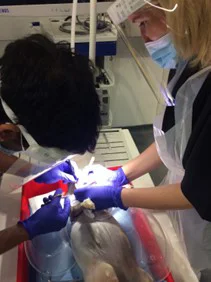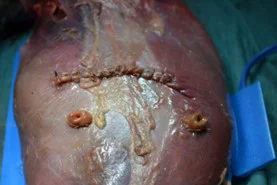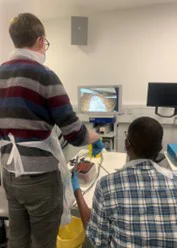The sick neonate poses many challenges for all involved in their care. To ensure safe surgery for this patient group, the surgeon’s fine motor skills must be well developed and honed. The fragile nature of these patients means careful tissue handling is vital to ensure that operations are carried out with a certain delicacy and precision of movement. In our department, we were aware that the paediatric surgical trainees, in the early years of learning, were not getting ample opportunity to operate on such cases, with more experienced trainees prioritised. This imbalance in our program began to shape our thinking on ways to provide a simulated alternative.
We began our focus on a rabbit model, akin to neonatal size. Trial sessions in the RCSEd wet lab allowed us to develop a number of simulated dissections, namely: open central line insertion, thoracotomy with oesophageal anastomosis, laparotomy with split spouted ileostomy and abdominal closure with Stamm gastrostomy. A downsized laparoscopic simulation box was developed with a piglet stomach mounted inside. This allowed practice of the basic manoeuvres of fundoplication and intracorporial suturing. The mounted tissue can also be reorientated to resemble a tracheooephageal fistula with oesophageal atresia. Thoracoscopic division of the fistula and oesophageal anastomosis can then be practiced. Each preparation requires fine motor skills to complete the task, and we see that the full day of activity helps to ‘kick start’ the necessary conscious focus needed for this type of detailed dissection and operative approach. Refined movements, with minimal tissue damage begin to take shape and trainees feel better connection of head with hands.
This one day course is further supplemented with on-line precourse material demonstrating each preparation and key learning points. On the day, the wet lab activity is sandwiched between classroom anatomy/embryology teaching pertaining to the simulated operation.
Course comments have included
- Excellent faculty to student ratio. There was the same level of enthusiasm and attentiveness from the very start till the very end of the day!
- This is the best course I have ever attended, with the faculty focused on providing relevant and specific feedback.
- There was a clear focus on making the most out of every minute of the day. There was very little redundant time compared to similar courses I have attended.
- Very well organised course. Faculty was great very approachable, encouraging and providing continuous supervision and constructive feedback. The venue of the course is excellent, it’s always an honour to be in the historical RCS Edinburgh. Pre course material was very beneficial clear concise and nicely demonstrated. Working specimen and skill lab was very well prepared.
Further information on the course being held on 28 October 2025 can be found by CLICKING HERE.

Each attendee partners with another to dissect and assist in each operative task through out the day.

Rabbit prep, Laparotomy with ileostomy formation and abdominal wall closure.

Simulated laparoscopic fundoplication on piglet stomach.


